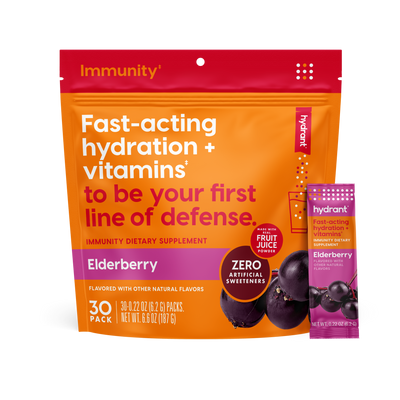Many of us reach straight for the kettle in the morning. Whether you’re on team tea or coffee, starting the day without a brew may be almost unthinkable. Both tea and coffee contain caffeine, but there’s a difference in the way each makes you feel that comes down to more than that. Not only does tea contain caffeine, it also contains a molecule that coffee doesn’t. It’s called L-theanine, and the powerful pairing of L-theanine and caffeine has far more potential than you might think [1]. We’re going to tell you all about it, but be warned: reading on will inspire you to try it for yourself!
Caffeine (the one you know)

We’ve all heard about caffeine. It’s a molecule naturally found in tea and coffee, and also now found in manufactured items, such as sodas. It’s technically a drug. Caffeine acts by stimulating your central nervous system (that’s your brain) making you feel more alert and awake [2]. If you’re a coffee or tea drinker, you’ll know that buzz you get afterwards—that's from the caffeine.
L-theanine (the one you don’t know)

L-theanine is an amino acid (a specific type of biological molecule) that is found in tea. You may also have seen it in tablet form on drugstore shelves. Over the last 10 to 20 years, scientists have become more and more aware of the effects of L-theanine in the body, and it turns out that some of them are really useful. These effects include better sleep, better immune function, increased focus, and decreased stress [3]. If you’ve ever tried meditating (and been marginally successful), you’ll know it’s associated with a deep sense of relaxation but also high mental alertness. This is very similar to the effect produced by L-theanine in the body [4]. Sounds good to us!
Tea(m)-work makes the dream work
What’s most interesting about these two molecules is the effect they have together. A cup of tea is great—the soothing warmth helps us unwind while the kick of caffeine keeps us alert. However, research shows there’s more going on. The caffeine and L-theanine in tea are acting on your body as a team (who knew?). As always, we’re here to unpack the research and see what this dynamic duo could be doing for you.
Alertness and Cognitive Performance
A 2013 study that compared participants given L-theanine and caffeine compared to those given a placebo (a fake version of the drug) showed increase accuracy in some mental tasks [5]. A 2008 study showed that some aspects of memory and attention are improved more in participants who took caffeine and L-theanine than who just had caffeine [6]. Further investigations have shown increased reaction time and word recall time, and revealed that L-theanine alone does not produce these beneficial effects; it must be combined with caffeine [1]. What does that mean for you? Well, all these effects in your brain mean you can be more alert and better at ignoring distractions. So you can get more work done, be more focused and be your best self while you are distraction- and fatigue-free.
And if that wasn’t enough, it seems L-theanine works by calming down some of the activity in your brain, which is almost the opposite of what caffeine does. Scientists have noticed this leads to a reduction in stress and anxiety. Win, win. With busy lives and stressful jobs, the need to chill is familiar to many of us. Caffeine and L-theanine might be just what you need [7]. There’s still a lot more research to do in this area, but it’s exciting stuff. It might explain why so many of us feel the need to reach for a cup of tea when we’re feeling stressed!
Immune System
Your immune system fights illness and disease. One of its main roles is protecting you from infectious diseases, such as colds and flu. These pesky bugs can completely throw you off your game (as you’ll remember if you got the flu this year). Every little thing you can do to keep your immune system strong is a defense against infection, and a great way to make sure you are your best self every day.
One of the key components of your immune system is white blood cells. L-theanine enhances the action of certain types of white blood cells, specifically γδ (gamma delta) T lymphocytes. These cells are involved in the defense against tumors and infections. It is believed that L-theanine primes the cells so they are more ready to respond when the body is under threat. This leads to a stronger, faster response, and an associated decrease in symptoms [8]. A study of 200 healthcare workers found that those who took L-theanine were less likely to get the flu than those who did not [9].
Sleep Quality
We all know that caffeine can keep us awake, and many of us use it if we’re feeling a little drowsy. In contrast, one of the fantastic things about L-theanine is that it has a relaxing effect. Researchers in the UK found that tea-drinkers had less disrupted sleep than coffee drinkers [10]. This research, and other work like it, has led to further investigations into why tea and coffee have different impacts on sleep. It’s looking more and more like the answer is—you guessed it—L-theanine.

Although in-depth research hasn’t yet been done, we can use other research to start to understand L-theanine and sleep. For example, stress and anxiety are known to decrease sleep quality; because L-theanine decreases stress and anxiety, we can predict that it likely increases sleep quality and/or quantity [11].
And there you have it...
...the effects of caffeine and L-theanine in combo might be just what you need to keep going through the day. Being less anxious, more alert, less distractible, and less vulnerable to coughs and colds is going to help you be your best self, get more out of every day and live your best life. The list of possible positive effects is even longer than we’ve mentioned here. For example, research suggests L-theanine may have a protective effect in our brains, reducing injury from events such as strokes [7]. It may be helpful in lowering blood pressure, which is great because caffeine raises blood pressure [12]! The data just keeps coming, and we hope you’re now as excited as we are about this dynamic duo.
We’ve been working on the perfect product to deliver the powerful pair to you in a simple sachet.
Writer: Ailsa McKinlay















